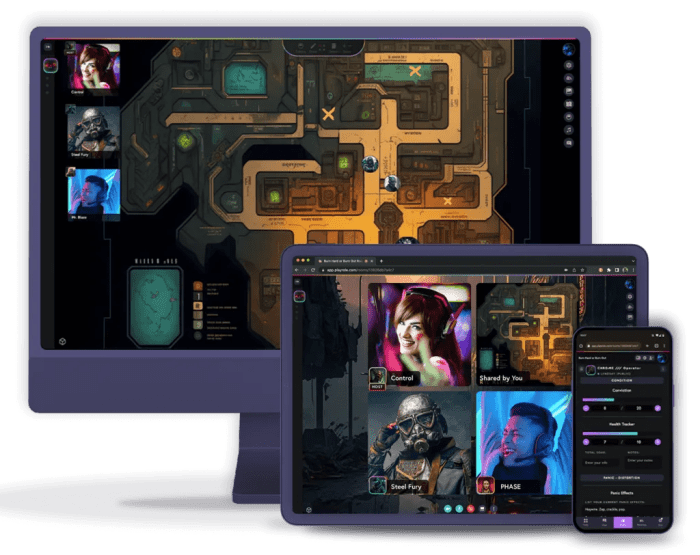
Virtual tabletop platforms are transforming the way we engage with games, bringing the classic tabletop experience into the digital realm. These platforms have gained immense popularity, allowing players to connect from anywhere in the world while enjoying their favorite board games, card games, and role-playing adventures.
As technology advances, the evolution of tabletop games into virtual formats has opened up new possibilities for both casual and serious gamers. With a variety of platforms available, each offering unique features tailored to different gaming styles, there has never been a better time to explore the world of virtual tabletop gaming.
Virtual Tabletop Platforms Overview
Virtual tabletop platforms have transformed the way players engage with tabletop games, allowing users to enjoy their favorite activities in an online environment. With the recent surge in digital gaming, these platforms have gained immense popularity, providing an accessible way for friends to connect and play regardless of their physical locations. The rise of virtual tabletops has enabled a broader audience to experience the joy of tabletop gaming, attracting both new players and seasoned veterans.The evolution of tabletop games into virtual formats can be traced back to the increasing demand for online gaming solutions and the need for social interaction among players.
Traditional tabletop games faced challenges due to geographical constraints and busy lifestyles, prompting developers to create digital adaptations. These virtual platforms often offer customizable elements that enhance gameplay, such as integrated character sheets, dynamic maps, and automated dice rolling. The transition has not only preserved the essence of tabletop gaming but also enriched the experience with modern technology.
Popular Virtual Tabletop Platforms and Their Features
Numerous virtual tabletop platforms have emerged, each offering unique features that cater to a variety of gaming preferences. Below are some of the most well-known platforms in the gaming community:
- Roll20: Renowned for its user-friendly interface, Roll20 facilitates seamless gameplay with features like integrated voice and video chat, customizable character sheets, and a vast library of pre-made content. Its marketplace allows players to purchase and access various game modules and assets.
- Foundry Virtual Tabletop: A more flexible option, Foundry offers extensive customization through user-created modules and systems. It supports a range of games and provides tools for automated gameplay, dynamic lighting, and map creation, allowing for an immersive experience.
- Fantasy Grounds: This platform is particularly popular among fans of complex RPG systems. Fantasy Grounds offers a robust set of tools for managing campaigns, including built-in rulesets for numerous tabletop games, automated character management, and an advanced dice roller.
- Tabletop Simulator: Unlike traditional VTTs, Tabletop Simulator mimics a physical tabletop with 3D environments. Players can manipulate pieces and create custom game setups, offering a unique blend of realism and digital convenience.
- Dungeon Fog: Focused primarily on map creation, Dungeon Fog allows users to design detailed battle maps for their campaigns. With a library of assets and an intuitive design interface, it enhances the visual aspect of gameplay.
Each of these platforms has distinct strengths that cater to different gaming styles and preferences, making them invaluable tools for both new and experienced tabletop enthusiasts. The continued development of these platforms is likely to further enhance the digital gaming landscape, providing even more opportunities for immersive experiences.
Integration with Various Game Types

Virtual tabletops (VTTs) have transformed the gaming landscape by providing versatile platforms for a multitude of game types. By allowing players to engage with different genres from the comfort of their homes, these platforms bridge the gap between traditional tabletop experiences and modern gaming. VTTs cater to diverse gaming preferences, making them popular among board game enthusiasts, card players, and roleplaying game (RPG) fans alike.
Board Games and Card Games
Virtual tabletops facilitate a wide range of board games and card games through digital adaptations that preserve the original game’s mechanics while enhancing accessibility and interactivity. Many VTTs offer built-in tools for users to customize their gameplay experience, including options for automated game setup, scoring, and rule enforcement. Some key features that enhance board and card games on VTTs include:
- Automated Rule Enforcement: VTTs can automatically enforce game rules, ensuring players adhere to the game’s structure without confusion or disputes.
- Dynamic Game Boards: Many platforms allow for customizable game boards that players can modify in real-time, adding a layer of creativity to traditional gameplay.
- Real-Time Interaction: Players can interact with game components seamlessly via drag-and-drop mechanics, enhancing the experience compared to physical setups.
Integration of Arcade and Coin-Op Games
Integrating arcade and coin-op games into virtual platforms expands the gaming experience beyond traditional tabletop formats. This integration often involves the use of emulators that replicate the original arcade game’s environment while allowing for multiplayer capabilities.Key methods for integrating arcade games include:
- Emulation Software: VTTs can utilize emulators to run classic arcade games, providing players with nostalgic experiences in a virtual setting.
- Scoreboards and Leaderboards: Online platforms can integrate competitive elements such as score tracking and leaderboards, fostering a community among players.
- Custom Mods: Players often create and share modified versions of arcade games, enhancing gameplay and keeping the experience fresh.
Benefits for Roleplaying Games
Roleplaying games (RPGs) have seen significant enhancements through the features and tools offered by virtual tabletops. The ability to create immersive worlds and manage complex narratives has been revolutionized by technology, allowing players to engage more deeply than ever before.Important features that benefit RPGs include:
- Diverse Character Management: VTTs allow players to manage character sheets digitally, enabling automatic calculations for stats, health, and abilities.
- Interactive Maps and Environments: Game masters can create detailed maps with dynamic elements, such as fog of war and hidden areas, making exploration exciting and unpredictable.
- Voice and Video Integration: Many platforms offer built-in voice and video chat, allowing players to communicate effectively, which is essential for immersive roleplaying experiences.
Community and Social Interaction

In virtual tabletop environments, community engagement plays a crucial role in enriching the gaming experience. These platforms create spaces where players can connect, collaborate, and share their passion for tabletop gaming, transcending geographical barriers. Engaging with a community fosters a sense of belonging and camaraderie, making every session more enjoyable and immersive.Online games leverage the capabilities of virtual tabletop platforms to enhance social interaction among players.
Through features like chat functions, video calls, and shared digital resources, players can communicate effectively and build friendships that often extend beyond the game itself. As players engage in cooperative storytelling and strategic gameplay, they develop bonds that enhance their overall experience.
Designing Interactive Events and Sessions
Creating events and sessions that promote player interaction in virtual settings is essential for cultivating a vibrant community. Here are key strategies to consider when designing these engaging experiences:
1. Theme-Based Sessions
Developing a unique theme for each session can spark interest and excitement among players. Themes can range from classic fantasy adventures to modern sci-fi escapades, providing a fresh backdrop for storytelling.
2. Interactive Challenges
Incorporating challenges that require teamwork can deepen player interaction. Puzzles, combat scenarios, or resource management tasks can encourage players to strategize together.
3. Character Spotlights
Giving players the opportunity to highlight their characters can boost engagement. This can be through character backstory sharing or showcasing special abilities during critical moments in the game.
4. Feedback Loops
Creating an environment where players feel comfortable providing feedback is vital. Regular check-ins can help gauge player satisfaction and tailor future sessions to better meet their needs.
5. Utilizing In-Game Tools
Making use of the tools available within the virtual tabletop platform—for example, shared maps, visual aids, and integrated dice rollers—can enhance the gameplay experience. These tools can make interactions more dynamic and facilitate smoother communication during complex scenarios.
6. Community Events
Organizing larger community events such as tournaments or themed game nights can foster a sense of unity. These gatherings allow players to meet others within the community, share experiences, and collaborate on long-term campaigns.By implementing these strategies, game masters can create an environment that promotes strong social interaction and community engagement, ultimately leading to more memorable and enjoyable gaming experiences.
Epilogue
In conclusion, virtual tabletop platforms have not only redefined how we play games but have also fostered a vibrant community where social interactions thrive. As we continue to embrace these innovative tools, the possibilities for engaging gameplay and enhanced collaboration are limitless, making virtual tabletop platforms an exciting frontier in the gaming landscape.
Clarifying Questions
What are virtual tabletop platforms?
Virtual tabletop platforms are online services that allow players to play tabletop games in a digital format, facilitating gameplay through virtual boards and interactive tools.
How do I get started with a virtual tabletop platform?
To get started, choose a platform that suits your gaming preferences, create an account, and explore tutorials or community guides to learn how to set up your games.
Can I play with friends who are not local?
Absolutely! Virtual tabletop platforms are designed for remote play, enabling you to connect with friends regardless of geographical locations.
Are there any costs associated with using virtual tabletop platforms?
Some platforms are free, while others may charge for premium features or subscriptions, but many offer a range of options to accommodate different budgets.
What types of games can be played on virtual tabletops?
Virtual tabletops support a wide variety of games, including board games, card games, and role-playing games, often with tools for customization and integration.




